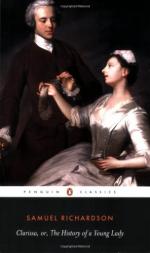ClarissaHarlowe.
April x.
[Then the year.]
AETAT. XIX.
For ornaments: at top, an hour-glass, winged. At bottom, an urn.
Under the hour-glass, on another plate, this inscription:
Here the wicked cease from
troubling: and here the
weary be at rest. Job. iii. 17.
Over the urn, near the bottom:
Turn again unto
thy rest, O my soul! for the Lord hath
rewarded
thee: And why? Thou hast delivered my
soul
from death; mine eyes from tears; and my feet
from
falling. Ps. cxvi. 7, 8.
Over this is the head of a white lily snapt short off, and just falling from the stalk; and this inscription over that, between the principal plate and the lily:
The days of man
are but as grass. For he flourisheth as a
flower
of the field: for, as soon as the wind goeth over
it,
it is gone; and the place thereof shall know it no
more.
Ps. ciii. 15, 16.
She excused herself to the women, on the score of her youth, and being used to draw for her needleworks, for having shown more fancy than would perhaps be thought suitable on so solemn an occasion.
The date, April 10, she accounted for, as not being able to tell what her closing-day would be; and as that was the fatal day of her leaving her father’s house.
She discharged the undertaker’s bill after I went away, with as much cheerfulness as she could ever have paid for the clothes she sold to purchase this her palace: for such she called it; reflecting upon herself for the expensiveness of it, saying, that they might observe in her, that pride left not poor mortals to the last: but indeed she did not know but her father would permit it, when furnished, to be carried down to be deposited with her ancestors; and, in that case, she ought not to discredit those ancestors in her appearance amongst them.
It is covered with fine black cloth, and lined with white satin; soon, she said, to be tarnished with viler earth than any it could be covered by.
The burial-dress was brought home with it. The women had curiosity enough, I suppose, to see her open that, if she did open it.—And, perhaps, thou wouldst have been glad to have been present to have admired it too!—
Mrs. Lovick said, she took the liberty to blame her; and wished the removal of such an object—from her bed-chamber, at least: and was so affected with the noble answer she made upon it, that she entered it down the moment she left her.




